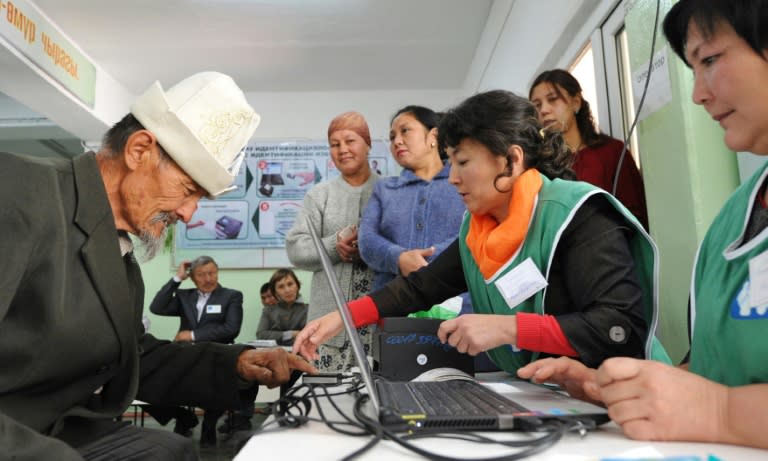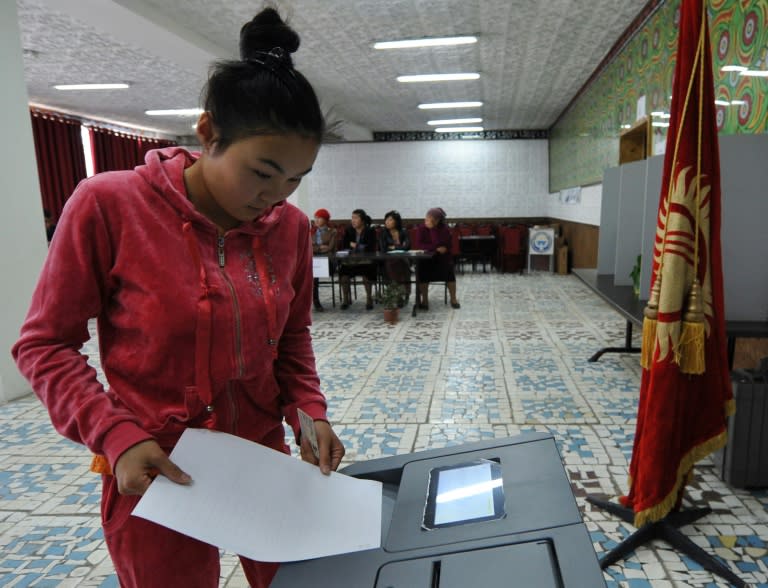Pro-Russian Social Democrats win Kyrgyzstan elections
The Social Democratic Party of Kyrgyzstan, linked to pro-Moscow President Almazbek Atambayev, came out on top at Sunday's parliamentary election in the ex-Soviet state, with five other pro-Russian parties also winning seats. Results released by the country's Central Electoral Commission showed the SDPK, founded by Atambayev, won the hard-fought poll with close to 27 percent of the vote. In second place was the nationalist Respublika-Ata-Jurt party at just over 20 percent. Most of the parties competing in the election appeared to be alliances of convenience, targeting a regionally divided electorate without clear political platforms. Since no party won a majority, a pro-Russia coalition government will be formed, presaging a continuation of the in-fighting that saw four cabinets collapse in the five years of the last session. Any new government will be forced to address an economy battered by growing inflation at home and shrinking remittances from hundreds of thousands of nationals working in Russia. The four other parties which passed the seven-percent barrier required for parliamentary representation in the Central Asian nation were also pro-Russian parties. The Kyrgyzstan party garnered over 12 percent while Onuguu-Progress, Bir Bol and Ata-Meken all won less than 10 percent each. The six that made it into the new parliament were spearheaded by candidates from the outgoing legislature, although Bir Bol, Onuguu-Progress and Kyrgyzstan did not compete as parties in the 2010 election. - 'More intrigue and corruption' - Majority Muslim Kyrgyzstan's relatively strong parliament and civil society make it an outlier in authoritarian Central Asia, a landlocked region synonymous with ageing dictators and terrible human rights records. But the vote is unlikely to alter the strongly pro-Russian foreign policy endorsed by all the parties competing, or ease the serious economic and security challenges the country of six million faces. On a warm autumn day in the capital Bishkek, voters stressed the need for stability and national harmony, five years after a bloody revolution and ethnic violence that claimed over 500 lives. "I am for the Ata-Meken party because this party has a strong leader who does not divide the country into north and south," Abdyrahman Abdyrahman uulu, a pensioner told AFP. "I am voting for SDPK. It is the strongest party," said Yulia Zakharchenko, a 36-year-old nurse, adding that "whoever wins, it will be five more years of intrigue and corruption." Critics of the government accuse it of turning a blind eye to economic problems and warn of risks of Islamic radicalisation. The International Crisis Group last week released a gloomy report describing Kyrgyzstan as troubled by economic pain in Russia and instability in Afghanistan. These risks are "exacerbated by leadership failure to address major economic and political problems, including corruption and excessive Kyrgyz nationalism," the report said. - Biometric data - Sunday's election was the first time Kyrgyzstan voters have been required to submit biometric data to cast their ballots, fuelling fears that polling stations would be overwhelmed by the introduction of the new technology. But while some people complained of delays in the vote-casting process and others could not find their names on the voter rolls, the government hailed the process as having minimised opportunities for the kind of electoral fraud widespread at previous elections. "Our country has achieved something special. We showed the world we can hold elections in the same way a modern developed democracy can," Kyrgyz political analyst Marat Kazakpayev told AFP. Yet Kazakpaev expressed disappointment about the make-up of the new parliament. "Of course there are not enough young people (in parliament). The old corrupted elite has kept power, which is very sad." Kyrgyzstan has sounded the alarm over the danger posed to the country, and the wider region, by the Islamic State group in Iraq and Syria, where hundreds of its citizens have reportedly gone to fight. The Organisation of Security and Cooperation in Europe sent a mission of over 300 observers to monitor the Kyrgyz ballot. The mission will deliver its verdict on the vote on Monday.

 Yahoo Finance
Yahoo Finance 



